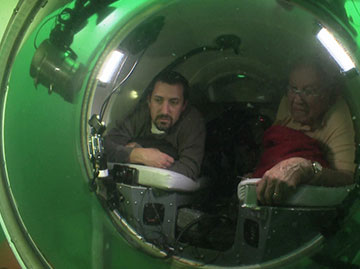Some things are just meant to be. For US-based underwater search specialist Andy Sherrell, one of those things was to work on the search for missing Malaysia Airlines Flight MH370.

When his daughter was born on 8 March 2014, the day Malaysia Airlines flight MH370 disappeared, Andy’s wife Renee suggested that was one search he was unlikely to be involved in.
Having already worked on several major underwater search, salvage and recovery operations, including Air France Flight 447 in 2009, Alaska Air Flight 261 in 2000, Egypt Air Flight 990 in 1999, Swiss Air Flight 111 in 1998, and TWA Flight 800 in 1996, Andy’s reputation had grown in the industry.
But the new father, on the other side of the world to the strange disappearance of MH370, was very interested in the loss, but had other ‘domestic’ priorities.
The reputation of the Florida Institute of Technology graduate in Ocean Engineering, however, would soon find its way to the desk of the Australian Transport Safety Bureau’s Program Director for the search for MH370, Peter Foley.
“I flew out to Australia and met with Peter and soon after began work on one of the most difficult search operations I’ve been involved in,” Andy said.
“The sheer size of the search area given the limited loss information, the remote, cold and extremely harsh patch of ocean—add in the deep and mountainous seafloor and this is an overall very challenging operation. But I’m confident the plane will be found.
“I think we’ve proven that the confidence in our search is high when you consider some of the items we’ve discovered and our very high coverage percentages.
“We systematically search the areas of highest confidence, then move to the next area, which then becomes the new area of highest probability.
“Just like when you have lost your car keys, once you have looked on the table and they are not there, you move to the next likely spot.”
Andy’s key role is managing quality assurance for the project. It began with the tender process and planning for the search and continues with reviewing the extensive sonar data.
“The search strategy working group determines areas for us to search,” he said. “My main focus it to make sure we search that area and cover it with a high degree of confidence.
“Once we finish searching an area we want to say with a hand on our heart that we have high confidence the aircraft is not in that area.”
Andy spends around four months of the year in total in Australia, usually around three weeks at a time, split between Canberra, Perth, and Fremantle.
His previous work has been more ‘shipboard and hands on’ but with his MH370 role, it’s more about the quality assurance across all the underwater search assets, which at times has been up to four vessels simultaneously.
He says the best aspect of the job is working with the team from the ATSB, with a common goal. “They are dedicated, focused and will do all they possibly can to find the plane,” Andy said.
“The worst aspect is being away from my family in the US. But I get looked after very well by my cobbers at the ATSB.”
Unfortunately, Andy has not been able to enjoy Australia’s iconic Vegemite on his toast in the morning. About five years ago he became allergic to the yeast in beer.
“Vegemite contains similar yeast to what’s found in beer. Really disappointing,” he said. Sarcasm, it seems, is an international skill.


